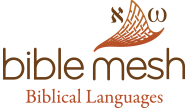

GRK220/GRK520: Greek Reading 2
In Greek Reading 2 you will continue to learn Greek grammar and vocabulary by translating the Sermon on the Mount (Matthew 5–7). Building on what you have learned in Greek Reading 1, you will master Level 2 grammar topics and, upon completion, you will know all vocabulary that appears 50 times or more in the Greek New Testament.
At a Glance
- Assigned proctor to guide you through the course and provide extra assignments
- Access to all Level 2 text-based resources, audio recordings, videos, and assessment tools
- Access to the BibleMesh vocabulary learning system for all words from the Sermon on the Mount (Matthew 5–7) and all words that appear 50 times or more in the Greek New Testament
- $280 per month access to complete the course at your own pace
More Details
In Greek Reading 2 you will continue to learn Greek grammar and vocabulary by translating the Sermon on the Mount (Matthew 5–7). Accessing our online course at your own convenience, you will read text-based resources, watch instructional videos, listen to audio recordings, use our cutting-edge vocabulary building application, and engage our extensive assessment tools. Using this combination of learning methods, you will master Level 2 grammatical concepts and review Level 1 grammatical concepts. Upon completion of the course, you will also know all vocabulary that appears 50 times or more in the Greek New Testament. Your guided reading of the Sermon on the Mount will deepen your understanding of the Greek language and increase your confidence to read the Greek New Testament.
Example Timeframe: 8–10 hours per week in order to complete in 16 weeks
Course Overview
You will learn vocabulary words that appear 50–99 times in the Greek New Testament (about 125 words total), review the content of Level 1, and learn key information about the following grammar topics:
- Nominal uses of genitive and dative cases
- Uses of Αὐτός
- Personal pronouns
- Possessive pronouns
- Demonstrative pronouns
- Present middle/passive indicative forms
- Imperfect middle/passive indicative forms
- First aorist active indicative forms
- Future active indicative forms
- Future middle/passive indicative forms
- Future forms with contract verbs
- Middle and passive functions of the middle/passive voice
- Imperative mood
- Commands and prohibitions
- Imperfective active imperative forms
- Imperfective middle/passive imperative forms
- Perfective active imperative forms
- Perfective middle/passive imperative forms
- Subjunctive mood
- Contract verbs
- Square of stops
- Imperfective middle/passive infinitive form
- Perfective middle/passive infinitive forms
- Participles introduction
- Agents and other semantic roles
About the Technology
Developed By
Video Lecturers

Dr. Mark Dubis
Mark Dubis is Professor of Biblical Studies at Union University in Jackson, Tennessee. He has a passion for ancient languages, having taught Greek, Hebrew, and Latin. He also has a special concern for the global needs of Bible translation. He is the author of 1 Peter: A Handbook on the Greek Text among other publications. Mark provides a high-level understanding of both linguistic and exegetical principles and, from his years in the classroom, he knows how to make student learning enjoyable and effective.

Dr. Nicholas Ellis
Nicholas Ellis was College Lecturer of Biblical and Hellenistic Greek at Wycliffe Hall, University of Oxford from 2009-2014. He is now a postdoctorate visiting research scholar at Duke University. With an academic background in biblical studies, Jewish studies, and New Testament studies, Nicholas provides the team with excellent classroom experience and a keen interest in linguistic, theological, and historical research. Nicholas completed his graduate studies in Theology (New Testament) from the University of Oxford. He is the author of The Hermeneutics of Divine Testing: Cosmic Trial and Biblical Interpretation in the Epistle of James and Other Jewish Literature (WUNT: Mohr Siebeck, 2014), among other publications.

